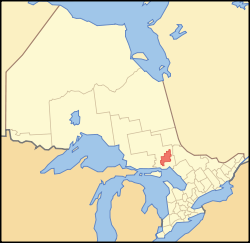Sudbury, ON
|
Greater Sudbury Grand-Sudbury |
|||||
|---|---|---|---|---|---|
| City (single-tier) | |||||

From top left: Downtown Sudbury Skyline, Big Nickel, Bridge of Nations, Inco Superstack, Bell Park, and Science North
|
|||||
|
|||||
| Nickname(s): "Nickel Capital", "Nickel City", "City of Lakes" | |||||
| Motto: Aedificemus (Latin for "Come, let us build together") |
|||||
 |
|||||
| Coordinates: 46°29′24″N 81°00′36″W / 46.49000°N 81.01000°WCoordinates: 46°29′24″N 81°00′36″W / 46.49000°N 81.01000°W | |||||
| Country | Canada | ||||
| Province | Ontario | ||||
| Established | 1893 (as Sudbury) | ||||
| 2001 (as Greater Sudbury) | |||||
| Government | |||||
| • Mayor | Brian Bigger | ||||
| • Governing Body | Greater Sudbury City Council | ||||
| • MPs |
Paul Lefebvre (Liberal) Marc Serré (Liberal) |
||||
| • MPPs |
France Gélinas (NDP) Glenn Thibeault (Liberal) |
||||
| Area | |||||
| • City (single-tier) | 3,228.35 km2 (1,246.47 sq mi) | ||||
| • Metro | 3,924.48 km2 (1,515.25 sq mi) | ||||
| Elevation | 347.5 m (1,140.1 ft) | ||||
| Population (2016) | |||||
| • City (single-tier) | 161,531 (29th) | ||||
| • Density | 49.7/km2 (129/sq mi) | ||||
| • Urban | 128,086 | ||||
| • Metro | 164,689 (24th) | ||||
| • Metro density | 49.5/km2 (128/sq mi) | ||||
| Time zone | EST (UTC-5) | ||||
| • Summer (DST) | EDT (UTC-4) | ||||
| Forward sortation area | P3A to P3G, P3L, P3N, P3P, P3Y | ||||
| Area code(s) | 705/249 | ||||
| Telephone exchanges |
705–207, 222, 280, 396, 397, 479, 507, 521, 522, 523, 524, 525, 546, 547, 550, 551, 552, 553, 554, 556, 560, 561, 562, 564, 566, 585, 596, 618, 626, 662, 664, 665, 669, 670, 671, 673, 674, 675, 677, 682, 688, 690, 691, 692, 693, 694, 695, 698, 699, 805, 853, 855, 858, 866, 867, 897, 898, 899, 919, 920, 929, 966, 967, 969, 983 249-810, 878 |
||||
| Highways |
|
||||
| Website | www.greatersudbury.ca | ||||
705–207, 222, 280, 396, 397, 479, 507, 521, 522, 523, 524, 525, 546, 547, 550, 551, 552, 553, 554, 556, 560, 561, 562, 564, 566, 585, 596, 618, 626, 662, 664, 665, 669, 670, 671, 673, 674, 675, 677, 682, 688, 690, 691, 692, 693, 694, 695, 698, 699, 805, 853, 855, 858, 866, 867, 897, 898, 899, 919, 920, 929, 966, 967, 969, 983
Greater Sudbury, commonly referred to as Sudbury, is a city in Ontario, Canada. It is the largest city in Northern Ontario by population, with a population of 161,531 at the Canada 2016 Census. By land area, it is the largest city in Ontario and the seventh largest municipality by area in Canada. It is administratively a single-tier municipality, and thus not part of any district, county, or regional municipality.
The Sudbury region was sparsely inhabited by the Ojibwe people of the Algonquin group for thousands of years prior to the founding of Sudbury following the discovery of nickel ore in 1883 during the construction of the transcontinental railway. Greater Sudbury was formed in 2001 by merging the cities and towns of the former Regional Municipality of Sudbury with several previously unincorporated townships. Being located inland, the local climate is extremely seasonal with average January lows of around −18 °C (0 °F) and average July highs of 25 °C (77 °F).
The population resides in an urban core and many smaller communities scattered around 300 lakes and among hills of rock blackened by historical smelting activity. Sudbury was once a major lumber centre and a world leader in nickel mining. Mining and related industries dominated the economy for much of the 20th century. The two major mining companies which shaped the history of Sudbury were Inco, now Vale Limited, which employed more than 25% of the population by the 1970s, and Falconbridge, now Glencore. Sudbury has since expanded from its resource-based economy to emerge as the major retail, economic, health and educational centre for Northeastern Ontario. Sudbury is also home to a large Franco-Ontarian population that influences its arts and culture.
...
Wikipedia


